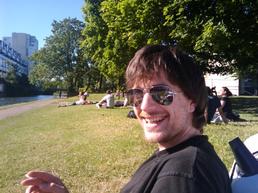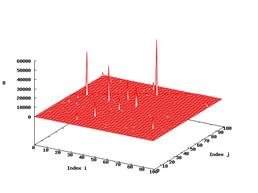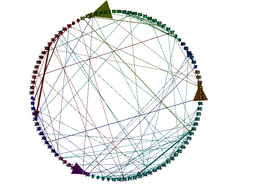
William Hurndall
- Position
- Postgraduate Research Student
- Institution
- Electronics and Computer Science (FPAS)
- Contact
- Complete this online contact form to contact William.
Prior to joining the Center for Doctoral Training in Complex Systems Simulation in 2012, my educational background lay in the physical sciences (BSc Theoretical Physics, MSc Quantum Fields and Fundamental Forces). On joining the CDT, my interests diversified into a number of inter-related areas including evolutionary biology, artifical life, the origins of life and the major transitions in evolution.
My current research interests are focused on
- reaction networks, strongly connected autocatalytic sets and potential units of heredity in artificial chemistries
- the [limited] evolvability of compartmentalised autocatalytic sets.
- the accumulation of adaptation and the process(es) by which self-replicating units organisationally and functionally decouple information storage and processing machinery in such artificial chemistries.
The ultimate objective of my current work is to construct idealised and classifiable models within an artificial physical chemistry that demonstrate the decoupling of storage and processing apparatus by accumulation of adaptation. Such decoupling is widely seen as necessary for open-ended evolution, both due to the emergence of epigenetic inheritance due to the increased coupling to the environment and because this type of increased coupling might allow adaptation to favour division of labour and cooperation. For these reasons, the study of physical chemistries is a research area is not only of interest in itself, but might shed light on the major transitions in evolution at other levels of the biological hierarchy.
This work is funded by the EPSRC
Research Interests
Life sciences simulation: Biomathematics, Biomolecular simulations, Developmental Biology, Epigenetics, Evolution, Structural biology
Physical Systems and Engineering simulation: Biomechanics, Catalysis
Socio-technological System simulation: Human population, Self Organized Networks, Social Networks
Algorithms and computational methods: Agents, Artificial Neural Networks, Cellular automata, Evolutionary Algorithms, Graph Theory, Molecular Dynamics, Monte Carlo, Multi-scale, statistical analysis
Visualisation and data handling software: Gnuplot, Pylab
Software Engineering Tools: Eclipse
Programming languages and libraries: C, Maple, Matlab, Python, R
Computational platforms: Linux
Transdisciplinary tags: Complex Systems, Computer Science, Scientific Computing
Working with...
 Markus Brede Markus BredeSenior Lecturer, Electronics and Computer Science (FPAS) |
 Richard Watson Richard WatsonSenior Lecturer, Electronics and Computer Science (FPAS) |


